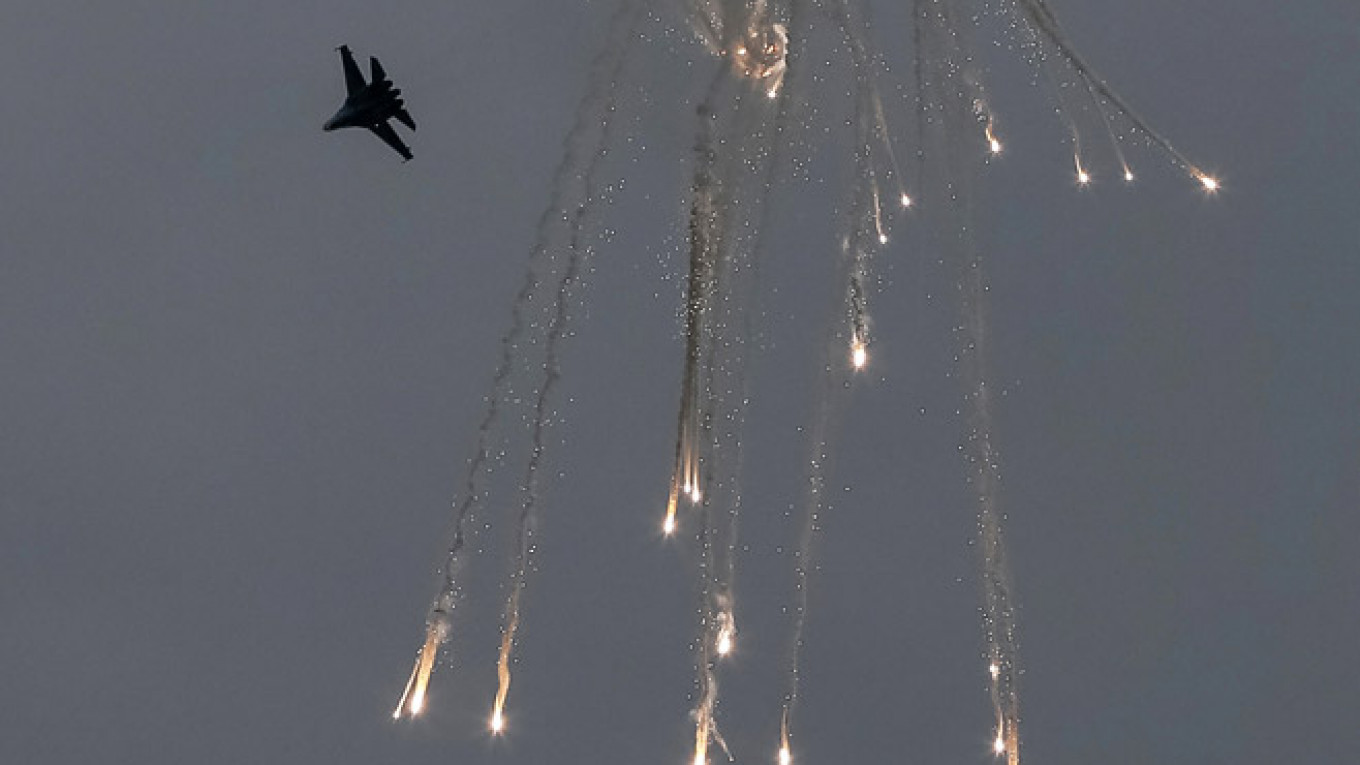Washington and Kiev have recently launched a flurry of accusations that Moscow supplied separatists with the means to down Ukrainian military planes, but in light of a dearth of hard evidence, Russian military experts say that the anti-aircraft missiles used likely come from Ukraine's own stocks.
"Ukraine has had many portable air-defense systems since Soviet times. They were even disposing of them with the help of U.S. money," said Anton Lavrov, a military expert with Moscow-based think tank the Center for Analysis of Strategies and Technologies.
On Wednesday, the insurgents claimed to have hit two Su-25 attack jets near Horlovka in the Donetsk region.
On Tuesday they claimed to have downed another Su-25 near Snezhnoye in the same area.
On Monday, they shot down a transport plane that was carrying food and water for government troops fighting in the east.
Defense Minister Valery Heletey said that the Ukrainian Soviet-produced An-26 was traveling at an altitude of 6,500 meters, making its downing an impossible feat for the mobile air-defense systems (MANPADS) at the rebels' disposal.
"The plane was downed by another, more powerful rocket weapon, that probably was used from the Russian territory," according to a statement on Ukraine's presidential website.
The insurgents said that the plane was shot down using the Strela-10 mobile anti-aircraft missile system that has been in production since 1979 and is utilized by both the Ukrainian and Russian armies, RIA Novosti reported.
The Strela-10 can only reach a target at an altitude of up to 3,500 meters, which would make the hit impossible based on Heletey's account of events. However, the insurgents have said that the An-26 was actually traveling at a lower altitude, as it had to release the cargo it was carrying for the army.
"They can think whatever they like. They could as well have said that the aircraft had been shot down with a missile fired from the other end of the globe," one of insurgents' military leaders, Alexei Chmylenko, told Interfax on Monday.
At the end of June the insurgents also said that they captured a Buk missile system that is capable of hitting aircrafts at altitudes of up to 18 kilometers.
Earlier, insurgents claimed to have downed several other military and transport aircrafts, including at least seven Su-25 attack jets, three Su-24 attackers, one Su-27 fighter jet, an Il-76 military transport aircraft, and at least 17 Mi-8 and Mi-24 military helicopters.
Former Maidan activist and now representative of the Ukrainian government Tatyana Chyornovol said on Friday that Ukraine only has ten military helicopters left.
The U.S. State Department released a statement on Tuesday accusing Russia of providing the insurgents with weapons capable of hitting the heavily armored, advanced supersonic aircrafts.
"We are confident Russia has already delivered tanks and multiple rocket launchers [to the insurgents]," the statement said. "After recapturing several Ukrainian cities last weekend, Ukrainian officials discovered caches of weapons that they assert came from Russia, including MANPADS, mines, grenades, MREs [Meals Ready to Eat], vehicles and a pontoon bridge," it said.
Each weapon has a serial number which can be used to track its origin, according to Lavrov.
"So far Ukrainian authorities have not presented any tangible evidence that these weapons originated in Russia," he said.
According to Alexander Khramchikhin, a military analyst at the Institute for Political and Military Analysis, Ukrainian insurgents had all the means to down aircraft using the weapons captured from Ukrainian bases.
"The only reason Russia would supply armaments to insurgents now is get rid of its own scrap metal," he said.
"The proof that the Ukrainian authorities presented is laughable. It is aimed at a Ukrainian public that does not care about evidence," he said in a phone interview.
See also:
European Court to Consider Complaint of Ukrainian Pilot
Contact the author at i.nechepurenko@imedia.ru
A Message from The Moscow Times:
Dear readers,
We are facing unprecedented challenges. Russia's Prosecutor General's Office has designated The Moscow Times as an "undesirable" organization, criminalizing our work and putting our staff at risk of prosecution. This follows our earlier unjust labeling as a "foreign agent."
These actions are direct attempts to silence independent journalism in Russia. The authorities claim our work "discredits the decisions of the Russian leadership." We see things differently: we strive to provide accurate, unbiased reporting on Russia.
We, the journalists of The Moscow Times, refuse to be silenced. But to continue our work, we need your help.
Your support, no matter how small, makes a world of difference. If you can, please support us monthly starting from just $2. It's quick to set up, and every contribution makes a significant impact.
By supporting The Moscow Times, you're defending open, independent journalism in the face of repression. Thank you for standing with us.
Remind me later.






